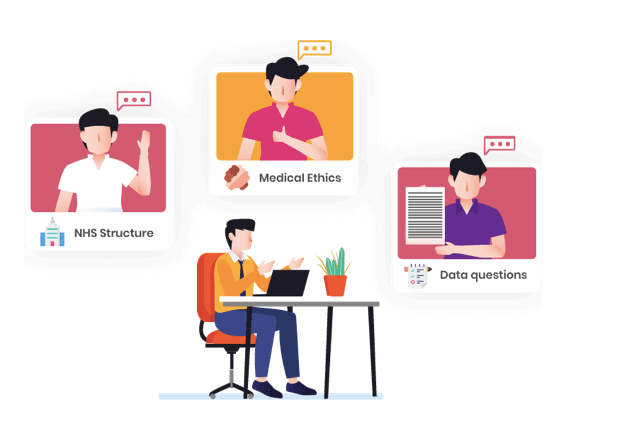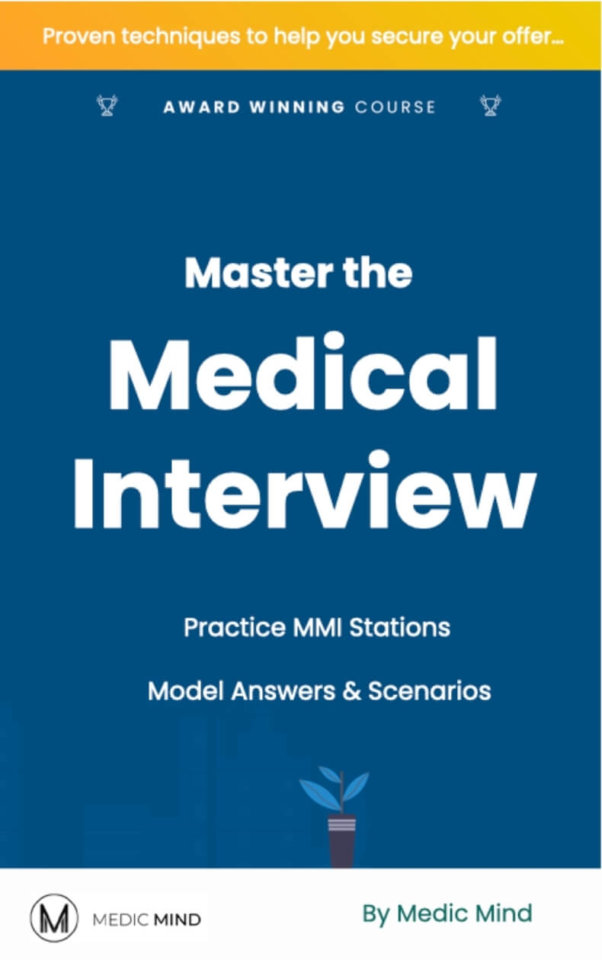Loading...

Interview Questions: Motivation for Medicine
Why Medicine?
Not only is it a well-regarded profession, but a career in medicine directly supports patients by helping to solve their medical ailments and supporting them through their treatment. However, medicine does not just mean working as a GP or as a surgeon. There are over 60 different specialties from medical practice specialties, research and even teaching.
Personal Motivation for Medicine
So, why do you want to study medicine? The question that we all know is coming but often dread, as it isn’t ever a simple answer. When discussing why you really want to be a doctor or why you want to study medicine, there are many things you can talk about. You may want to talk about your work experience and how this gave you insight into a career as a doctor, but you also want to talk about what motivated you in the first place to consider medicine as a career option.
Below we discuss the main things that you need to consider addressing in your answer for why you want to study medicine, focusing on your motivation for the career.
Kickstart your Interview Prep
Book a session with one of our expert interview tutors to boost your chances of getting into medical school! Call us on +44 (0) 203 305 9593 for a free consultation.
Interest in science
Medicine is a science based degree, therefore it might be considered essential that you have an interest in science to want to study medicine, but where does that interest stem from? Was it an experiment you did in school? Is it a strength of yours that aided your enjoyment of the subject, that lead you to look at a career in science field? It may be any number of things that originally sparked your interest in science.

Desire to help people
Being a doctor involves helping people, hopefully something that you have seen in your work experience when shadowing doctors. Therefore it is important that you tell the examiner why you want to help people. Do be careful when talking about this not to become too bogged down with your passion for helping people, as there are many other points you will want to cover in your answer.
Interest in patient contact and human engagement
To be a doctor you need to be a people person, as you are talking to patients, other doctors and allied healthcare professionals all day, every day. Being involved with patients is a huge part of the job of a doctor, and is something that is a key difference between going into scientific research and healthcare. However, be clear that you understand the difference between doctors and allied healthcare professional roles and focus your answer in talking around the role of the doctor and your interest in that aspect.
Insights from work experience
You have done the hard work of getting those hours of shadowing doctors and chasing them round hospitals, so tell the examiner about them! Remember to focus on what you have learnt from your experiences and why this has made you more sure than ever that a career as a doctor is right for you
Other
There are many other reasons as to why you want to be a doctor and to study medicine. Examples may be personal medical stories or experiences, as well as factors such as family or relatives in the career that has motivated you to follow in their footsteps. If you wish to share this with the examiner then please do. Remember your journey to deciding to apply for medicine is unique to you.
My model answer to why do you want to study medicine?
For reference I am a graduate medical student. This is for inspiration only.
My interest in a career in medicine started back in secondary school when I studied the history of medicine during my GCSE history class. I was amazed by how early on medical advances were made, often before the mechanisms of diseases were fully understood, if at all. One specific example is Joseph Lister who was the pioneer of antiseptic techniques, as well as developing a carbolic acid steam spray device to maintain antiseptic conditions during operations. This sparked my interest in medical sciences, as well as my love for the sciences at school.
I have always been interested in science and research, which is why I went on to study my undergraduate degree in biomedical science, followed by postgraduate study in clinical oncology. However, I felt that the element of human contact was missing from my career and job role that left me feeling unsatisfied in my work. I took a short break from my scientific career and worked as an Account Manager in London, where my role was all about building and maintaining professional client relations. I really enjoyed the client facing role of being in contact with people, problem solving and sales aspects of the job role, however I then missed the scientific aspects of my study and research that I had previously undertaken. I had previously thought of a career in medicine, so I undertook work experience shadowing doctors to affirm that the balance of human interaction and science was what I really was looking for in my career. I undertook multiple shadowing opportunities in a local A&E department, where I was able to appreciate the broad spectrum of patients that present in primary care from major cases to minors. I was even able to assist a consultant with gathering equipment required in resus and discussing blood charts, which I hadn’t previously had much experience in reading. The passion the consultant had for both his job and in encouraging the future generation of doctors helped in affirming my desire to study medicine.
Further to this, I travelled to the Dominican Republic to shadow a general surgeon, as well as complete some voluntary work at a local orphanage. The stark contrast between the healthcare settings in the UK and in the Dominican Republic made me really appreciate the NHS both as a patient and as a prospective medical student with the investment in training great doctors and allied healthcare professionals.
I have long been passionate about helping people, having volunteered for the past three years as a dementia befriender and patient visitor at my local hospital. Where I sit and chat to patients with dementia and those who don’t have visitors. It has been such a fulfilling role as it made me realise how important being caring, empathetic and compassionate to patients in hospital is, especially to those who are often in hospital for great lengths of time without many visitors.
All my experiences over the past few years have affirmed my decision to pursue a career in medicine, as it combines my two passions of scientific knowledge and research with that human engagement I have enjoyed so much in various employment roles I have previously worked in. From my work experience I have seen how being a doctor is the perfect combination of my two passions, and ultimately why I want to be a doctor.
Kickstart your Interview Prep
Top Tips:
- Remember your motivation to study medicine will be different to others, it is your personal reasons to study medicine that the examiner wants to hear
- Try to avoid cliche or uneducated comments such as “I can earn lots of money as a doctor”, because although you can, you could do so much easier in many other professions.
- Focus on why being a doctor is appealing as opposed to being a nurse, pharmacist or other allied healthcare professional
- Be prepared! This is one of the only questions you can very easily prepare for, as you will know your personal motivations off the top of your head. Make a bullet point list of what you would like to say in your answer to this.
- Smile, the examiner wants to see your passion for medicine, so smile and show them in your answer all the fantastic insight you have gained!
Frequently Asked Question
→What are some common interview questions related to motivation for medicine?
Some common interview questions related to motivation for medicine include:
- What inspired you to pursue a career in medicine?
- What do you think are the most important qualities for a doctor to have?
- How do you think you will handle the stress and pressure of medical school and a career in medicine?
- What are your long-term career goals in the field of medicine?
- Can you tell us about a challenging experience you had that motivated you to pursue a career in medicine?
→What should I avoid mentioning when discussing my motivation for medicine in an interview?
When discussing your motivation for medicine in an interview, you should avoid mentioning negative or controversial topics such as financial gain, political opinions, or negative experiences with healthcare providers. Instead, focus on positive reasons for pursuing medicine, such as a desire to help others, a passion for science and healthcare, or a personal experience with a medical condition.
→How can I stand out when discussing my motivation for medicine in an interview?
- Be authentic and passionate about your reasons for pursuing medicine.
- Highlight your unique experiences or perspectives that make you a good fit for the program.
- Show your knowledge and enthusiasm for the program and the field of medicine.
- Use specific examples and stories to illustrate your points and demonstrate your skills and qualities.
→How should I structure my answers to interview questions about motivation for medicine?
When answering interview questions about motivation for medicine, it is important to be clear, concise, and specific. You should provide concrete examples of experiences that have influenced your decision to pursue medicine and demonstrate how you have demonstrated your commitment to the field.
→What is the importance of motivation in medicine?
Motivation is essential for a successful career in medicine. It helps you stay focused on your goals, remain resilient in the face of challenges, and maintain a positive attitude towards your patients and colleagues.
Related
Related Articles
Related links
MMI interview preparation with our live interactive day and comprehensive feedback
Personalised 1-1 lessons, tailored to your interview preparation
Covering 8 interview topics, with model answers, live MMI analysis and hot topics





Was this article helpful?
Still got a question? Leave a comment
Leave a comment
366 Comments
Teopista kikosoMedic Mind Tutor
17 December 2020
Post was helpful,,,
AnonymousMedic Mind Tutor
7 January 2021
I do think this answer is too long for an interview. 3,300 characters is almost the length of a personal statement – it would take about 3 minutes to get through. A more appropriate amount of time is 1 minute for this question.
AnonymousMedic Mind Tutor
7 February 2021
But normally in each station you have to speak for about 5 mins so it makes sense as to why it is lengthy
Sophia CollinsMedic Mind Tutor
20 October 2021
Thanks for sharing such a information blog.
AnonymousMedic Mind Tutor
6 November 2021
I feel like you also can’t add this much detail on the day compared to a personal statement, where it be nerves or just time, however, it’s an amazing answer and very well written
RuvieMedic Mind Tutor
19 April 2022
It’s really a helpful post with well presented points thanks a lot
komal uniyalMedic Mind Tutor
9 September 2022
Thanks for your motivation article. it is soo motivational and knowledgement for the the student who want a career on medical lines. thanks for sharing…